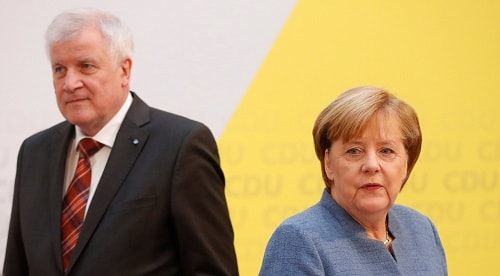Mrs. Merkel is at risk of losing her job because of the immigration crisis.
Merkel's position as German Chancellor is under threat as the ruling coalition faces the risk of collapse due to conflicts over immigration.
|
German Chancellor Angela Merkel(Right)and Interior Minister Horst Seehofer at a press conference in Berlin in October 2017. Photo:AFP |
"We are in a serious situation because the migration crisis has turned into a power issue," German MP Kai Whittaker told the German news agency yesterday.BBC"It is very likely that the situation will change by the end of next week, most likely a new prime minister."
German Chancellor Angela Merkel is maintaining a governing coalition with her Christian Democratic Union (CDU) party and the Christian Social Union (CSU) party led by Interior Minister Horst Seehofer. However, this coalition is seriously at odds over the issue of immigration, threatening Ms. Merkel's position.
The migration crisis began with Merkel's "open door" policy in 2015 to help Syrian refugees. However, it has opened the way for 1.6 million migrants from Africa, Asia and the Middle East to flood into Germany and its European Union neighbors, creating a crisis of housing, jobs, crime and other social problems.
Merkel's open-border policy has been opposed by Interior Minister Seehofer, who earlier this week proposed ordering German border guards to deny entry to refugees registered in other European countries.
However, Merkel objected and held several emergency meetings with party members to seek support. Although pledging to support the German Chancellor, CDU lawmakers also asked Ms. Merkel to change her "open door" policy towards immigrants, while CSU lawmakers declared their support for Seehofer.
The rift between the two parties' coalition puts Merkel in a difficult position, leaving her facing a serious power challenge that could limit her ability to negotiate with other EU members.
Merkel's position as German Chancellor is also under threat as the row with Seehofer could tear apart the hard-won political alliance between the two sides, meaning Merkel would once again lose the support of a majority of MPs in parliament and could have to hold a new national election.
A poll released on Thursday showed that 86% of Germans support measures to tighten border controls on asylum seekers.
Anti-immigrant sentiment in Germany has intensified after a 20-year-old Iraqi refugee was accused of raping and murdering 14-year-old Susanna Feldman on May 22.



